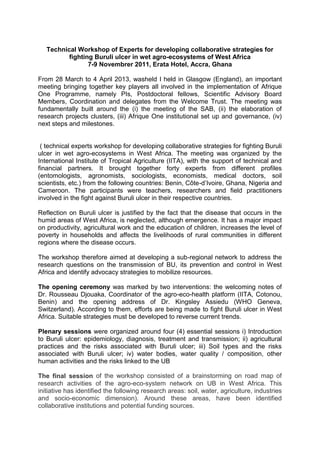Technical workshop of experts for developing collaborative strategies for fighting buruli ulcer in wet agro
- 1. Technical Workshop of Experts for developing collaborative strategies for fighting Buruli ulcer in wet agro-ecosystems of West Africa 7-9 Novembrer 2011, Erata Hotel, Accra, Ghana From 28 March to 4 April 2013, washeld I held in Glasgow (England), an important meeting bringing together key players all involved in the implementation of Afrique One Programme, namely PIs, Postdoctoral fellows, Scientific Advisory Board Members, Coordination and delegates from the Welcome Trust. The meeting was fundamentally built around the (i) the meeting of the SAB, (ii) the elaboration of research projects clusters, (iii) Afrique One institutional set up and governance, (iv) next steps and milestones. ( technical experts workshop for developing collaborative strategies for fighting Buruli ulcer in wet agro-ecosystems in West Africa. The meeting was organized by the International Institute of Tropical Agriculture (IITA), with the support of technical and financial partners. It brought together forty experts from different profiles (entomologists, agronomists, sociologists, economists, medical doctors, soil scientists, etc.) from the following countries: Benin, C?te-d’Ivoire, Ghana, Nigeria and Cameroon. The participants were teachers, researchers and field practitioners involved in the fight against Buruli ulcer in their respective countries. Reflection on Buruli ulcer is justified by the fact that the disease that occurs in the humid areas of West Africa, is neglected, although emergence. It has a major impact on productivity, agricultural work and the education of children, increases the level of poverty in households and affects the livelihoods of rural communities in different regions where the disease occurs. The workshop therefore aimed at developing a sub-regional network to address the research questions on the transmission of BU, its prevention and control in West Africa and identify advocacy strategies to mobilize resources. The opening ceremony was marked by two interventions: the welcoming notes of Dr. Rousseau Djouaka, Coordinator of the agro-eco-health platform (IITA, Cotonou, Benin) and the opening address of Dr. Kingsley Assiedu (WHO Geneva, Switzerland). According to them, efforts are being made to fight Buruli ulcer in West Africa. Suitable strategies must be developed to reverse current trends. Plenary sessions were organized around four (4) essential sessions i) Introduction to Buruli ulcer: epidemiology, diagnosis, treatment and transmission; ii) agricultural practices and the risks associated with Buruli ulcer; iii) Soil types and the risks associated with Buruli ulcer; iv) water bodies, water quality / composition, other human activities and the risks linked to the UB The final session of the workshop consisted of a brainstorming on road map of research activities of the agro-eco-system network on UB in West Africa. This initiative has identified the following research areas: soil, water, agriculture, industries and socio-economic dimension). Around these areas, have been identified collaborative institutions and potential funding sources.
- 2. Following the presentations, discussions have focused attention on the need for an interdisciplinary approach around many issues still suspense: the mapping of insect vectors of Buruli ulcer in West Africa, the contribution of traditional medicine, the predominance of socio-cultural aspects, the impact of climate change, etc. Towards partner institutions Support the network through the funding of selected research Towards country teams - Establish a database on the UB; - Provide training for stakeholders on various aspects of UB; - Develop a plea for case detection in high-risk areas. Various technical and financial partners of the workshop were thanked: Afrique One, MAP International, Raoul Follereau Foundation, etc. which provided support for the participation of various delegations.


